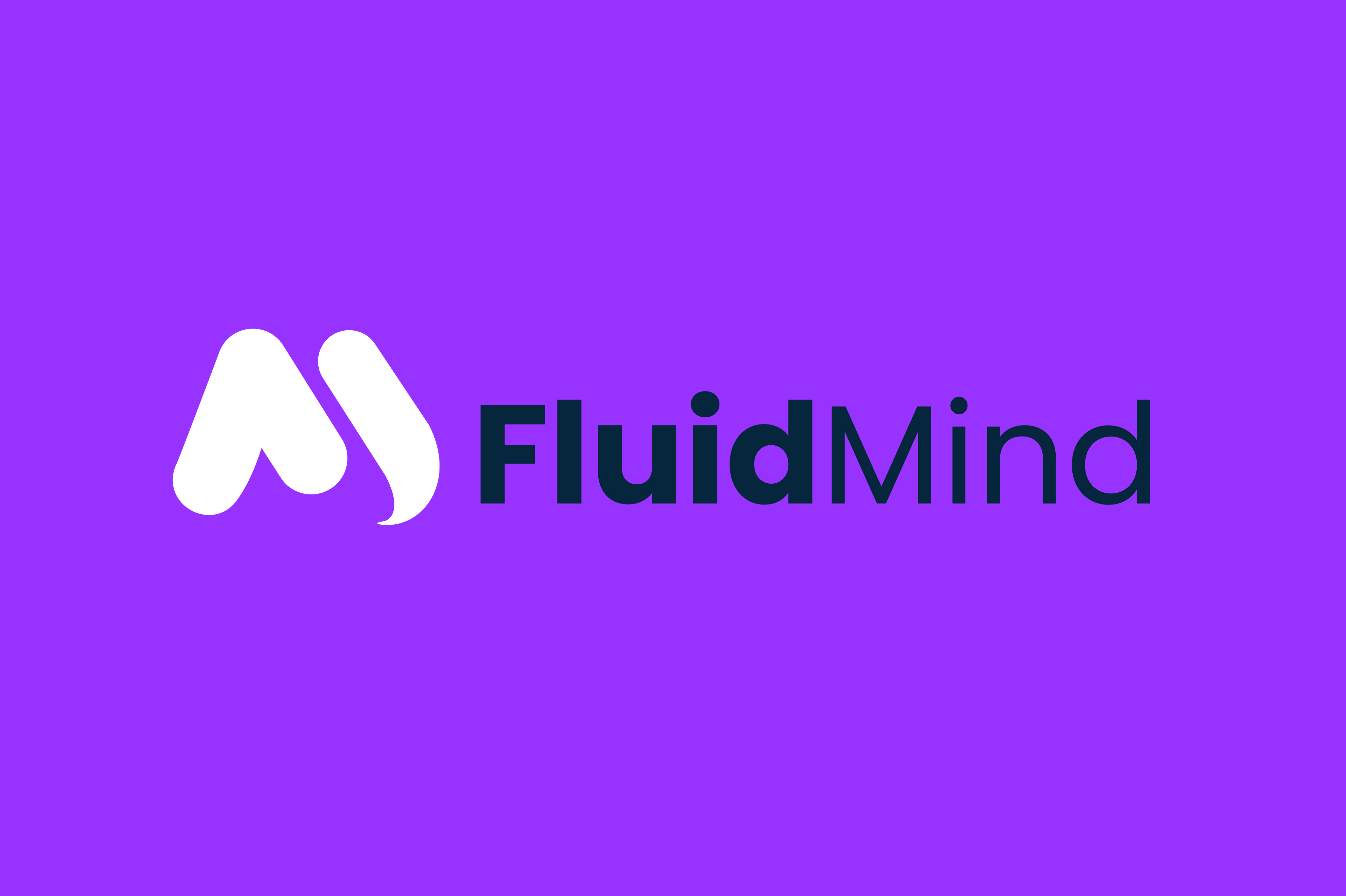What is FluidMind?
Written on June 11th, 2024 by Charlie
10 min read
FluidMind is a mobile app which acts as a “personality test” for mental health. It is also capable of tracking your mental health symptoms systematically through time. It does this through a series of daily questions, and your responses update a set of scores which measures a range of symptoms such as mood and anxiety through to dissociation and substance use. You can try FluidMind through the Apple App Store or Google Play Store if you are located in Canada.
After answering 15 to 30 questions a day for several days, the app may score your “obsessive thoughts” at 52% [moderate], “social avoidance” as 71% [severe], and “anhedonia” (the lack of pleasure in things you once enjoyed) as 16% [low]. Over time patterns will emerge which capture the state of your mental health in an impersonal manner.
You will submit a response (labelled from “strongly disagree” to “strongly agree”) to each randomly selected question, and the app’s algorithm will update your scores according to those responses. Of the hundreds of questions available in the question pool, you may encounter:
-
“I’ve never been this lonely in my life, it feels bottomless.”
-
“I feel anxious when there is only one exit available to me from a place or situation, or worse - no exit at all.”
-
“I have forbidden thoughts. If I think them, I get distressed.”
-
“I have episodes where I feel like I’m an outside observer to my thoughts and feelings.”
-
“I’ve used drugs and/or alcohol first thing in the morning to steady my nerves.”
What can FluidMind be used for?
Aside from assessing the severity of your symptoms, FluidMind acts as a gentle daily check in for your mental health. Users have reported feeling a sense of clarity from reflecting on the questions, whether they’ve been aware of the interrelated feelings or they’ve never considered a specific thought or scenario before. This daily reflection and symptom tracking can provide a grounding, quantitative analysis to your mental health journey.
My hope is that this app will ultimately lead to decreased times from symptom identification to access to treatment such as therapy. It may act as a “wake up call” for your mental health.
Mental health problems are usually first identified by the individual or their family members or friends. However, due to bias and denial, many people can persist through their symptoms without receiving appropriate treatment. In a typical case, it is only when the individual is in crisis that they seek medical help, or worse, they are forced to receive treatment as an inpatient.
FluidMind may decrease this delay to treatment and thus increase the probability of recovering from mental illness and avoiding major consequences of an untreated disorder. This could, in principle, ease the burden of disease seen from mental illness in personal suffering, disability outcomes, and the associated economic consequences.
Breaking down disorders into symptoms
The app also deconstructs the mental health disorders into their respective symptoms. To get a full list of all the disorders and symptoms tracked by FluidMind, see FluidMind: List of Symptoms and Disorders.
For example, OCD is broken into two symptom categories to be scored separately: “obsessive thoughts” and “compulsive behaviours”.
Those who suffer from OCD can become trapped in a loop of resisting obsessive thoughts and succumbing to compulsive behaviours in response, which in turn increases the intensity of future obsessions by training the brain that they are indeed worth fearing. Exposure and Response Prevention (ERP) therapy teaches us that, in order to break this loop, we must invert the pattern: instead, embrace the obsessive thoughts and resist the compulsive behaviours. Using FluidMind gives someone with OCD the ability to measure how intense their obsessive thoughts are versus how much they are resisting their compulsions.
Symptoms ebb and flow
This hypothetical person with OCD (let’s call him Howard) can watch as his symptoms evolve. He may start using the app while he is “euthymic” (an extended period of relief between episodes of mental illness), and his scores are low for both the obsessive thoughts and compulsive behaviours symptom categories. But then, as Howard’s life changes, his symptoms begin to flare up.
First, the obsessive thoughts score starts to rise as his fears over contamination gain momentum - his score now jumps from low to mild to moderate. At this point he starts compulsively checking to see whether or not he is sick from the perceived contamination, and his compulsive behaviours score rises to moderate as well. As his compulsions intensify, so does his obsessions, until finally he scores severe for both obsessive thoughts and compulsive behaviours.
Howard decides he’s reached a breaking point, since OCD is now getting in the way of his daily functioning and it’s causing him a debilitating amount of distress. He decides to take up ERP therapy with a trained therapist, and he’s assigned exercises to help him face his obsessions and resist his compulsions.
As he puts this into practice, his compulsive behaviours score slowly but surely starts to dip. Over time, he stills scores severe for obsessive thoughts but now its mild for compulsive behaviours - progress! He knows that if he can keep his compulsive behaviours score decreasing, eventually his obsessive thoughts score will follow suit, and with enough investment into his therapy, that’s exactly what happens.
This ebb and flow of symptoms puts the fluid in FluidMind, and it is common amongst those with mental illness in a world with imperfect treatments. There is currently no cure for OCD, major depression, bipolar disorder, dissociative disorders, or any other mental health disorder, but treatments do exist and they can help. Your symptoms will evolve over time, and FluidMind can give you insight into that process as you keep track of your mental health.
Catching unexpected symptoms
Mental health disorders can make someone feel exceptionally isolated and lonely, but these disorders don’t like to walk alone themselves. For instance, depression and anxiety occur comorbidly for many cases. In particular, we know that 2 in every 3 people with a depressive disorder will also currently have an anxiety disorder, and visa versa.
But what if you don’t know what you have? You might think “yes, I only experience some agoraphobia” but you or your doctor have not been able to identify that you also experience social anxiety and symptoms of derealization. FluidMind is designed to catch those comorbidities.
Since the app is comprehensive in its approach and the questions are pooled across symptom categories, it may report symptoms or fully-fledged disorders which have gone missed for months or even years. Once an indication has been flagged by FluidMind, the user can take this information and present it to a trained medical professional for further investigation.
Can FluidMind be used for outpatients?
One of my goals with FluidMind is to not only provide value to someone experiencing mental health issues, but to also provide value to their doctors. For example, therapists, clinical psychologists, and psychiatrists can ask their clients to keep up with the app on a daily basis and then show them their results at their next visit. This can give quantitative insights to the mental health professional to help them evaluate the impact of a therapy, medication, life style change, etc.
In my own experience, one of the major drawbacks of a mental health evaluation is that it is subjective and it heavily relies on the provider-to-patient relationship. If a psychologist misses a key insight because they have a particular bias, this can lead to inaccuracies in the diagnostic procedure or the recommendation of a therapy. If a patient simply does not like their psychiatrist on a personal level, then they will be biased to not trust their provider’s judgement, and so they may not follow up with their treatment regiment, regardless of its validity.
The problem is bias, and FluidMind ameliorates that bias. The personal relationship between a provider and their client is replaced with an app which has no feelings, no bad days, no prejudices. It is quantitative, and when it becomes empirically validated in the future, it will represent an objective measure that may outperform subjective judgements.
Will FluidMind outperform medical professionals?
I would like to stress that FluidMind will not make psychiatrists obsolete, but it may change their procedure for evaluating and keeping up with their clients.
Ultimately, a psychiatrist or clinical psychologist does more than just ask their clients questions, record their responses, and assign a diagnosis. To evaluate their client, a mental health professional uses a combination of experience, knowledge of the literature and statistics, analysis of body language, review of associated behaviours, and beyond.
Furthermore, FluidMind takes one of five possible answers to a question: strongly disagree, disagree, neutral, agree, or strongly agree. A mental health professional can take an infinitude of answers to their intuitively chosen, refined questions, and then suggest an optimal therapy after compiling all that information.
What are the other limitations?
FluidMind itself cannot diagnose its users, and the algorithm used to calculate the scores based off the user’s responses is still in its infancy. However, it is my hope that any inaccuracies arising in this approach still outperforms the biased process of self-diagnosis, but I cannot yet guarantee that. For now, the app is provided for general informational purposes only, and if the user has any concerns or requires a diagnosis, then they are encouraged to seek the advice of a trained medical professional.
The app also cannot recommend any treatments, and it is not useful in an emergency scenario or for users having thoughts of suicide or self-harm. If you are having these thoughts, you can call 988, the Suicide Crisis Helpline. If you require immediate help, please contact 911 or go to the nearest emergency room.
Finally, and importantly, the app relies on a key characteristic of its user: insight. Many people with mental health disorders do not have sound insight into their condition, particularly if they have a psychosis spectrum disorder which induces anosognosia. But FluidMind relies on the user having good insight into their thoughts, feelings, and behaviours. If the user cannot report that accurately because they lack insight (or otherwise), then their results will certainly be inaccurate.
What are the assumptions?
Put plainly, the validity of the app relies on the following assumptions:
a) answering questions can actually derive enough information to measure these symptoms and disorders, and
b) that disorders are simply composed of their symptoms.
Does answering questions hold enough information to quantify one’s mental health? Is a “disorder” more than just a patterned clustering of symptoms, and what is the spread of those symptoms amongst the general public?
I do not know, but that variance of symptoms which flow through each other and passes through clusterings for each individual through time is another reason why I called it FluidMind. I believe it’s possible for someone to experience euthymia from major depressive disorder, but then transition into an anxious state of agoraphobia or a hypomanic state of bipolar disorder. These disorders are not fixed in place, they follow a unpredictable current and FluidMind will help capture that flow quantitatively.
Try FluidMind today
Mental health is an extremely complex phenomenon involving both the most intricate and powerful computer known (ie, the brain) and also one of the most pervasive mysteries known (consciousness). We are at the frontier of understanding and treating mental illness, just as physicists were at the frontier of understanding electricity and magnetism in the early 19th century. It is an exciting time, and many new technologies will emerge in this 21st century to help those who suffer become euthymic. FluidMind is one of those new technologies, and I would be grateful if you gave it a try on iOS or Android and spread the word.


